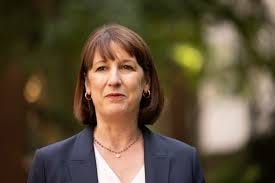I’ve known our Chancellor since she was a Bromley teenager, and I’m always asked to compare her to other Labour greats, particularly Gordon Brown, with whom I am also close. Few politicians impress me as much as her.
Unlike her predecessors, Rachel brings a reserved, compartmentalised approach to politics, closer to Gordon Brown's seriousness than Denis Healey’s combative style. Known for her hard work and discipline, Rachel rarely shows much of her personality in public beyond her passion for chess. Privately, she is warm and friendly, with a sharp sense of fun, though she’s always on guard.
Gordon shared her focused approach to the economy, though he was more party-political. Healey, on the other hand, tackled rampant inflation head-on, facing industrial strife with bold austerity and combative politics. Like Brown and Healey, Reeves is committed to Labour values but distinct in her quieter, more measured approach. She handles internal divides cautiously rather than through open confrontations. Dare I say she is more emotionally intelligent than her predecessors?
This cautious and balanced approach also reflects elements of other former Labour Chancellors, such as Alistair Darling, who stabilised the economy during the 2008 financial crisis with bank bailouts and careful fiscal management. Reeves, likewise, faces an economy marked by uncertainty but is focused on investment and targeted reforms to stimulate growth rather than outright cuts. She also has echoes of Hugh Dalton, who faced intense post-war recovery pressures, though Dalton took an austerity path, while Reeves champions modernisation through infrastructure and technology. Similarly, Roy Jenkins’s strategy of combining growth with social reform set a precedent for balancing fiscal responsibility with Labour ideals, an approach Reeves aims to follow by promoting fairness, regional equality and productivity.
Here, the comparisons have to end. Rachel faces a different landscape complicated by the aftermath of Brexit, the pandemic, and a cost-of-living crisis fuelled by domestic and global inflation underpinned by years of very poor national leadership. Unlike Healey, who had recourse to international support, or Brown, who benefited from favourable global conditions, Rachel must chart a course through a fragmented, inward-looking economy with limited fiscal space. The political and economic stakes are high; with the Conservatives painting Labour as fiscally irresponsible, Rachel knows that any missteps could undermine confidence and set her up for relentless attack.
The structural shift in the UK’s economy towards services compounds her challenge. Productivity in retail, logistics, and healthcare sectors has stagnated, partly because digitalisation and automation have created low-wage, gig-based roles rather than lifting productivity across the board. Brown’s era saw the benefits of balanced growth, with rising prosperity across most sectors. Today’s digital transformation, however, has led to wealth concentration in certain tech-driven regions, leaving others, particularly rural and industrial areas, struggling to keep pace.
Investing in digital infrastructure is therefore essential if Reeves is to deliver a fairer economy. Currently, only about 50% of rural areas have access to high-speed broadband, according to Ofcom, compared to around 80% in urban regions. This digital divide stifles local businesses and limits remote work opportunities, both of which are crucial for revitalising struggling areas. For example, rural regions like mid-Wales, which have historically been left behind in terms of connectivity, could benefit enormously from expanded broadband access, which would open up new avenues for local enterprise and bring these communities into the digital age. For Reeves, closing this gap isn’t just about technology; it’s about ensuring prosperity is distributed beyond the cities and into the regions that need it most.
In tandem with digital connectivity, Reeves must confront the UK’s energy infrastructure or lack thereof. Mid-Wales and other rural regions face a shortage of grid capacity, which limits both industrial expansion and the transition to renewable energy. With energy demand projected to double by 2050, the current grid will struggle to meet future needs without substantial upgrades. Expanding the grid network to support renewable energy sources, such as wind and solar, isn’t just an environmental imperative; it’s an economic one. Reliable energy infrastructure would allow these regions to attract industry, create jobs, and contribute to the green economy, allowing young workers to lay down roots, a key part of Reeves’s vision for a balanced, sustainable future.
Yet, these technological and infrastructure investments alone won’t be enough. Rachel must also address the UK’s skills gap, a persistent drag on productivity. According to the UK Employer Skills Survey, nearly 40% of employers report skills shortages, especially in technical and digital roles. To bridge this gap, Reeves’s economic strategy will need to invest in education and training for the jobs of the future, equipping workers with the skills needed to thrive in an increasingly digital, automated economy. This is more than just a workforce issue; it’s about ensuring that every region of the UK has the tools to compete in a globalised market. Addressing this skills shortage, particularly in underserved areas, could significantly boost productivity and help reverse the trend of economic concentration in London and the South East.
Technology holds undeniable promise for Reeves, but it must be harnessed thoughtfully. The potential for productivity gains is substantial: a recent McKinsey study estimates that digital adoption across sectors like retail, logistics, and finance could boost the UK’s productivity by 20-25% over the next decade. However, reaping these gains will require more than just investing in tech; it will demand a holistic approach addressing workforce development, regional investment, and fair labour practices. Digital transformation can catalyse long-term prosperity, lifting living standards nationwide and narrowing the regional gap if managed well.
Reeves’s economic vision cannot rely on a single silver bullet. She must balance investments in technology with targeted regional spending, workforce training, and robust infrastructure improvements. This blend of policies aims to drive growth and ensure that the benefits of that growth are felt across the UK. In the past, Healey and Callaghan’s tough fiscal measures and Brown’s commitment to public investment were tailored to the unique challenges of their times. Today, Reeves’s task is to shape an economy that can compete globally while providing opportunities for communities that feel left behind.
In the end, technology might be the tool that allows Reeves to unlock the UK’s productivity potential. But without the right framework, a balanced, inclusive approach that bridges regional divides and equips workers for a changing world, it won’t be enough.
Rachel’s challenge is to use technology not as an end in itself but as part of a broader strategy to create a resilient, fairer, more productive economy that works for all.
Listening
London boasts the world’s finest chefs, but two have always stood out for me: Richard Corrigan and Michel Roux. In a lovely conversation with James O’Brien this week, Michel Roux reveals his food philosophy. What shines through is the relentless dedication to a John Prescott-like culinary vision of traditional values in a modern setting.
Richard Corrigan keeps his Irish roots alive in every loaf of soda bread he serves, each infused with the taste of his mum’s kitchen. Meanwhile, Roux has long upheld the legacy of French cuisine with the Roux family’s unmistakable touch, running the country’s preeminent French family-run restaurant until recently. Both chefs understand that fine dining isn’t just about what’s on the plate; it’s a full-blooded experience of flavours, fine wines and a restaurant with character. Because, in the end, what’s a restaurant about if not good grub, fine wine, and great craic with friends?
Reading
A.C. Grayling’s A Very Short Introduction to Wittgenstein is a very accessible read, which in my case, is neccesary. Grayling guides readers through Wittgenstein’s intellectual journey, from early work on logic and language in the Tractatus to his later emphasis on language games and the nature of understanding in Philosophical Investigations.
Wittgenstein’s work urges us to question our assumptions about language, meaning, and reality. In his early work, he argued that language mirrors the world, famously stating, "Whereof one cannot speak, thereof one must be silent," suggesting there are limits to what can be expressed. This quote has intrigued me for nearly forty years after someone once wrote it in a leaving card and prompting me to buy the book!
Later, he viewed language as fluid and context-bound, with his concept of "language games" illustrating how words take on meaning only within specific uses. Grayling captures this evolution, underscoring Wittgenstein’s lesson on philosophical humility: that language, and thus our understanding, is often more limited and situational than we realise. Grayling’s book is a small but powerful guide to one of the 20th century’s most influential thinkers. I still don’t know why the guy from the fourth floor wrote the quote in my leaving card though!





An interesting and insightful read. This has been a huge undertaking for Rachel. I personally feel incredibly proud to be part of the movement that has women leaders like Rachel at the helm. She has managed to deliver a budget that bears outcomes of aspiration and hope.
Well done Tom on why Rachel Reeves will become Britain's most important and effective Chancellor of the Exchequer . Did you Rachel wrote the Forward to the reprinted edition of Ellen Wilkinson's The Division Bell Mystery during the period she was defeated in 1931 at Middlesbrough East and before she elected to represent the Jarrow Constituency in 1935, which had been created in 1885 when the South Shields Parliamentary constituency created in 1832 was divided. Best wishes Colin